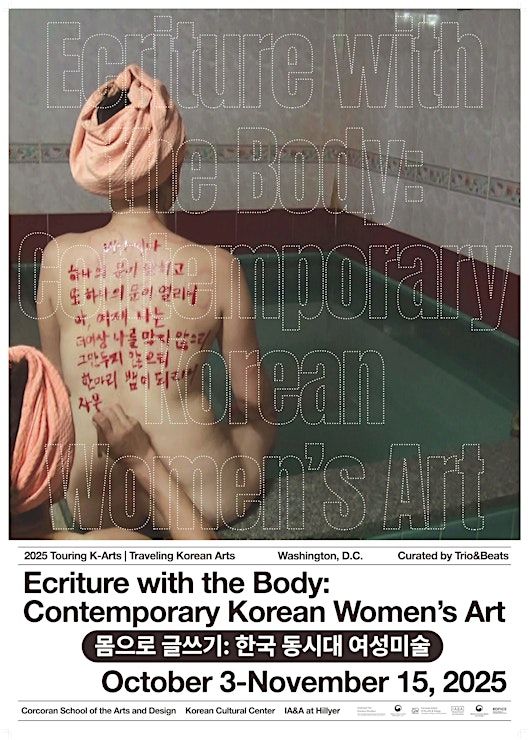Écriture with the Body: Contemporary Korean Women Artists
Schedule
Fri Oct 03 2025 at 03:00 pm to 05:00 pm
UTC-04:00Location
Flagg Building, Corcoran School for the Arts and Design, George Washington University, Please use New York Avenue Door | Washington, DC

About this Event
Écriture with the Body: Contemporary Korean Women Artists
October 3 - November 15, 2025
Wednesday - Saturday, 1 - 5 pm
Gallery 225
Flagg Building, Corcoran School of the Arts & Design, 500 17th St. NW
Opening Reception:
Friday, October 3, 3 - 5 pm
Center Atrium, Flagg Building, Corcoran School of the Arts & Design
Curated by Trio & Beats | Dr. Jung-Sil Lee and Dr. Koh Dong-Yeon
Organized by Korean Foundation for International Cultural Exchange (KOFICE) Supported by Ministry of Culture, Sports and Tourism of the Republic of Korea.
About the Exhibition:
Écriture with the Body brings together the work of 18 Korean and Korean American women artists who engage with writing, language, and text-based practices as powerful means of articulating subjectivity and resisting entrenched gender and racial inequalities. Rooted in Korean traditions historically shaped by patriarchy—such as calligraphy and literati painting—the exhibition reclaims these forms through an embodied feminist lens. Here, writing is not merely a tool of communication but a visceral assertion of presence, memory, and identity. By inscribing bodily expression into text, the artists generate transformative encounters for audiences. Their works interrogate and transcend formal conventions, offering renewed perspectives and forging empowering narratives that reclaim space within a historically patriarchal artistic lineage.
This collaboratively organized exhibition spans three venues and is structured around four interrelated subthemes.
First, the artists who challenge traditional Korean artistic modes and genres, particularly literati painting and calligraphy: Seongmin Ahn (minwha), Yeesookyung (jeong-ga), Kim Jipyeong (scroll), and Minsun Oh Mun (genre painting). Their works reimagine these inherited forms, exposing their patriarchal underpinnings and rearticulating them through contemporary perspectives.
Second, the artists who engage with Korean poetry as a site of disturbance and transformation: Yun Suknam (in dialogue with the poems of Heo Nanseoulheon), Jung Jungyeob (with the poetry of Kim Hyesoon), and Kook Dongwan (with her own dream books and journals). Through lyrical, fragmented, and deeply personal expressions, these artists disrupt conventional literary structures to illuminate silenced histories, subconscious emotions, and feminist consciousness.
Third, the artists who inscribe writing through the body as performance and documentation: Hong Lee Hyunsook, Cho Youngjoo, and Hyun Jung Kim. Here, the body becomes both medium and message—a living text inscribed with memory, affect, and defiance. Their works articulate embodied forms of resistance that speak to gendered histories and corporeal knowledge. In these practices, writing transcends the page, unfolding through gesture, ritual, and presence.
Lastly, the artists reimagine the legacy of Theresa Hak Kyung Cha. This section brings together works by Jean Shin, Kim Oksun, Ahn Okhyun, Yoon Jeongmee, Jaye Rhee, Su Kwak, Jean Jinho Kim, and Theresa Hak Kyung Cha—each engaging with the structural logic of language and its embedded hierarchies. Drawing from embodied, diasporic, and feminist experiences, these artists disrupt fixed systems of meaning and propose new visual and textual grammars. Their practices reimagine ecriture (writing) as fragmented, hybrid, and open-ended—forms that resist assimilation while creating space for multiplicity, uncertainty, and radical subjectivity.
About Co-curators:
Dr. Jung-Sil Lee is an art historian, critic, and curator specializing in modern and contemporary art from a global perspective. Her research interests span global modernism, ritual theory, feminism, and public art, with a particular focus on narratives at the intersection of decolonization and feminism. She has written extensively on modern and contemporary Asian artists who challenge traditional artistic norms by incorporating traumatic histories into their works. Dr. Lee’s recent publications include “Soaring (Narsha): Korean American Artists” (Asian Pacific Journal, vol. 23, August 2025), which reflects her curatorial vision for her exhibition at the American University Museum at the Katzen Arts Center, and “Colonized Bodies: Intersectional Women’s Movements of Korea and the Korean Diaspora in the U.S.” (Women’s History Review, vol. 34, no. 5, May 2025). She has also co-authored the textbook Modern and Contemporary Korean Art and Culture in Context (1950-Now) (Bloomsbury, 2025), developed from her pioneering course “Modern and Contemporary Korean Art and Culture” at George Washington University. As director of Trio & Beats and ArTrio, Dr. Lee has curated numerous exhibitions, including Collateral Damage (New York), Truth: Promise for Peace (Seoul and three other cities), Asian Pop Art (Virginia), Korean Wave (Washington, D.C.), and Bio Art (Maryland).
Dr. Dong-Yeon Koh (also known as Koh Dongyeon) is an art historian, curator, and critic specializing in postwar American art and contemporary Korean art. She is an adjunct professor at Ewha Womans University, Korea, and served as Artistic Director of the Gangwon International Triennale 2024. She has also served on the managing committee of the NaMAF (Seoul International ALT Cinema & Media Festival, 2017–2021) and as commissioner of the Goyang Outdoor Sculpture Festival (2017–2018). Dr. Koh has published extensively on contemporary Korean art, with a focus on popular culture, gender theory, and memory studies. Her criticism and essays have appeared in leading journals including The Inter-Asia Journal of Cultural Studies (Routledge), Flash Art, Modern Art Asia, Photography and Culture (Routledge), and Positions (Duke University Press). Her recent publications include “The Paradoxical Place of the Female Body in Feminist Arts in South Korea” in Korean Art from 1953 (New York: Phaidon Press, 2020, ed. Chung Yeonshim et al.), and The Korean War and Postmemory Generation: Korean Contemporary Art and Film (London: Routledge, 2021). She is also co-author of Modern and Contemporary Korean Art and Culture in Context (1950–Now) (Bloomsbury, 2025), and co-director of Trio & Beats.

Where is it happening?
Flagg Building, Corcoran School for the Arts and Design, George Washington University, Please use New York Avenue Door, 500 17th Street Northwest, Washington, United StatesEvent Location & Nearby Stays:
USD 0.00












